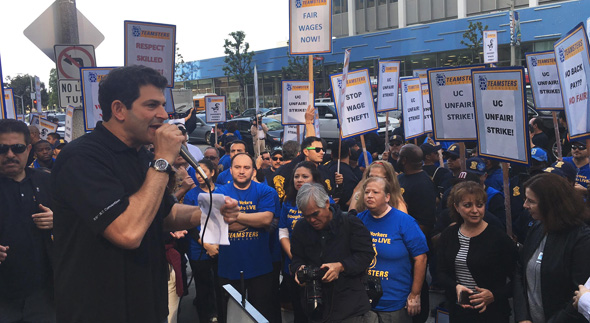
LOS ANGELES — Marching to chants such as “no contract, no peace,” and “if we don’t get it shut it down,” hundreds of skilled trades workers throughout the University of California Los Angeles (UCLA) campus and various medical centers went on strike November 16. Electricians, elevator mechanics, plumbers and other workers walked off the job Wednesday at UCLA to demand higher wages on day one of two planned strikes this week at a pair of University of California campuses. Union officials say the second strike was scheduled to take place at the University of California in San Diego (UCSD) Thursday, November 17th.
The Teamsters union represents the nearly 800 skilled trades workers at both UCLA and UC San Diego. On November 15, Teamsters Local 2010, which represents these skilled trades workers along with more than 3,000 clerical workers at UCLA, sent out a notice asking the public to reschedule all non essential medical appointments, and to avoid the UCLA campus and medical centers due to delays caused by the skilled trade workers being out on strike.
The UCLA skilled trades workers are currently in contract negotiations with UCLA. The strike is over the University’s refusal to negotiate over back wages and the UC’s numerous violations of state labor law, according to the Teamsters. A press release by the union noted that skilled trades workers at UCLA and UCSD are below prevailing wage by as much as $10 an hour.
Sam Huffman, a UCLA Facilities Mechanic, expressed that he “has not had a raise in four years,” and that he has to pay almost $1,000 per year for parking, and that his contributions toward retirement and for health care have gone up.

“It’s time for UCLA to show some respect for the skilled trade workers who keep the University running,” said Jason Rabinowitz, Teamsters Local 2010 Secretary-Treasurer. “These workers cannot afford to wait any longer for their long overdue raise.”
“UCLA refuses to negotiate the raises that were budgeted for us,” said Jon Kramer, a Ronald Reagan Hospital plumber. “They have yet to show us respect and continue to delay and stall negotiations.”
The striking workers were joined by UC employees, students, and community members with hundreds of people demonstrating on Wilshire Blvd. The crowds overflowed into the streets, blocking traffic at one of California’s busiest intersections.
“UC skilled trades workers provide the critical maintenance that ensures that hospitals, patient care clinics, conference facilities, sporting venues, student housing and instructional buildings will operate smoothly and safely,” Local 2010 stated in a press release. “The University is charging our customers more for our services and refuses to negotiate over the back pay which we worked for and earned,” added Clayton Benson, a UCLA building services engineer.
UC administrative support workers, who are also members of Local 2010, joined the demonstrations as well. Although not on strike themselves, the critical support staff, who work at University of California campuses statewide, and also represented by the Teamsters, showed solidarity with the skilled trades workers as their own battle with the UC system continues.
Support staff also protesting
As reported by People’s World, the 14,000 critical support staff are also fighting for fair wages and a stop to discriminatory pay practices. “The UC system has for decades been driving down frontline workers’ pay, while giving raises to its senior executives,” a statement by the local noted months ago. “Over the past two decades, administrative, support and clerical workers have seen the UC system hold down their real wages by nearly 24 percent,” the union said in a statement. The union says it is also fighting for workers’ retirement security.
On November 30th, the contract for the administrative and support workers will expire. The union noted that a strike by these workers will affect UC medical facilities and campuses throughout the state.
On Nov. 16, the same day as the UCLA strike, a group of UC workers attended the University of California Regents meeting in San Francisco in an effort to bring attention to the issues of hunger, food insecurity, and low wages that many administrative workers face. As a recent study by Occidental College concluded, 70 percent of full time clerical, administrative, and support workers throughout the University of California system suffer from food insecurity or hunger. A press release yesterday by the union noted that UC administrative support workers face hunger and food insecurity at a rate five times the national average.











